【精选】九年级英语全册Unit10You’resupposedtoshakehands第3课时学案新版人教新目标版
九年级英语全册Unit10You'resupposedtoshakehands(TheFirstPeriod—SectionA1a-2d教案人教新目标版
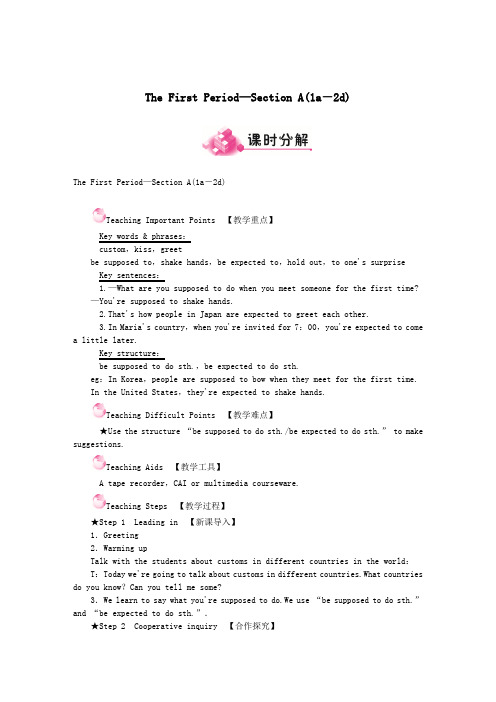
The First Period—Section A(1a-2d)The First Period—Section A(1a-2d)Teaching Important Points 【教学重点】Key words & phrases:custom,kiss,greetbe supposed to,shake hands,be expected to,hold out,to one's surprise Key sentences:1.—What are you supposed to do when you meet someone for the first time?—You're supposed to shake hands.2.That's how people in Japan are expected to greet each other.3.In Maria's country,when you're invited for 7:00,you're expected to comea little later.Key structure:be supposed to do sth.,be expected to do sth.eg:In Korea,people are supposed to bow when they meet for the first time.In the United States,they're expected to shake hands.Teaching Difficult Points 【教学难点】★Use the structure “be supposed to do sth./be expected to do sth.” to make suggestions.Teaching Aids 【教学工具】A tape recorder,CAI or multimedia courseware.Teaching Steps 【教学过程】★Step 1Leading in 【新课导入】1.Greeting2.Warming upTalk with the students about customs in different countries in the world:T:Today we're going to talk about customs in different countries.What countries do you know?Can you tell me some?3.We learn to say what you're supposed to do.We use “be supposed to do sth.” and “be expected to do sth.”.★Step 2Cooperative inquiry 【合作探究】1.Finish the task in 1a①Talk with the class about the background knowledge.②Read the words and the sentences in the picture.Match the countries and the customs in 1a.2.Finish the task in 1b①Play the recording and check their predictions.②Write the key words on the blackboard.And then ask the students to say the sentences with “be supposed to” and “be expected to”.3.Finish the task in 1c4.Finish the tasks in 2a-2b①Have a discussion with the class.②Get the students to guess Maria's mistakes in 2a.③P lay the recording for the first time.Students listen and check Maria's mistakes.④Play the recording again.Students listen and fill in the blanks in 2b.Focus on more details.⑤Check the answers with the whole class.Read the full sentences.5.Finish the task in 2c6.Finish the task in 2d①Talk about the picture and tell them John went to a welcome party for foreign students last night.②Ask the students to read the conversation in 2d.Learn the new words and phrases.③Ask some questions to hel p students understand the conversation.④Play the recording for the class to read aloud.⑤Practice role-playing the conversation in pairs.★Step 3Homework1.Talk about what people are supposed to do when they meet for the first time in China,Japan,America,France,and Brazil.2.Write the sentences about what people are supposed to do in the countries in 1a.3.Translate the following sentences into English.(1)在你们国家,人们第一次见面时该怎么做?________________________________________________________________________(2)美国人见面时握手。
九年级英语全册Unit10You’resupposedtoshakeh

九年级英语全册Unit10You’resupposedtoshakehUnit10 You’re supposed to shake hands.Section B (3a—Self Check)Learning goals:⼀、语⾔知识(常⽤词汇、短语和表达)1. on an exchange program2.be supposed to do3.be excited about…4.give sb. some suggestions and advice about…5.go out with…6.look forward to doing…7.show up8.be worth doing…9. in different situations 10.knock on 11. make sb.+ adj. 12.it’s + adj. + to do sth.⼆、语⾔功能1. Talk about different customs at home and abroad.2 能运⽤所学语⾔知识及be supposed to do 句型来谈论中西⽅⽂化和风俗习惯。
三、学习策略能让学⽣有意识的运⽤“be supposed to do/ it’s polite to do…”这⼀⽬标语⾔,谈论中西⽅⽂化和风俗习惯。
同时还启发了学⽣从所学的⽬标篇章中吸取供模仿写作的句型和表达,进⽽提⾼⾃⼰的写作能⼒四、情感态度引导学⽣了解各地不同的⽂化习俗并尊重各地的风俗习惯。
【设计意图】⽬标引领,表述了本节课的知识、能⼒和情感⽬标。
尤其突出对写作能⼒的要求和培养, 做到有的放⽮,增强课堂学习的针对性和时效性。
Teaching and learning stepsStep1. Pre-writing activities1. ReviewⅠ.Please translate the following sentences into English .1)他们尽最⼤努⼒使我感到宾⾄如归。
九年级英语上册unit10知识要点
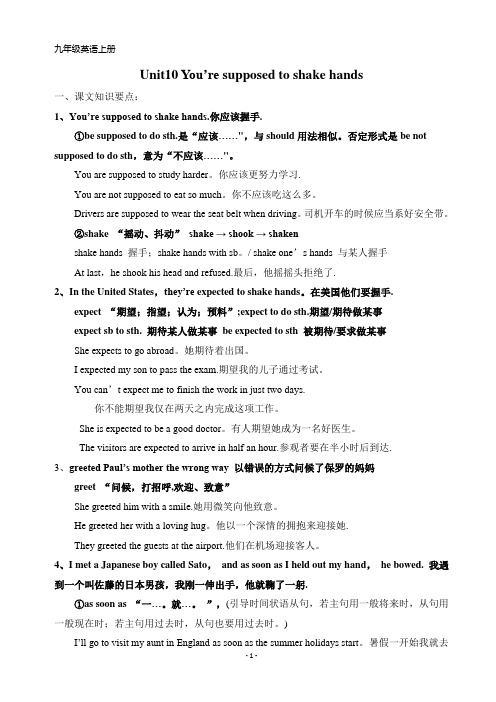
九年级英语上册Unit10 You’re supposed to shake hands一、课文知识要点:1、You’re supposed to shake hands.你应该握手.①be supposed to do sth.是“应该……",与should用法相似。
否定形式是be not supposed to do sth,意为“不应该……"。
You are supposed to study harder。
你应该更努力学习.You are not supposed to eat so much。
你不应该吃这么多。
Drivers are supposed to wear the seat belt when driving。
司机开车的时候应当系好安全带。
②shake “摇动、抖动”shake → shook → shakenshake hands 握手;shake hands with sb。
/ shake one’s hands 与某人握手At last,he shook his head and refused.最后,他摇摇头拒绝了.2、In the United States,they’re expected to shake hands。
在美国他们要握手.expect “期望;指望;认为;预料”;expect to do sth.期望/期待做某事expect sb to sth. 期待某人做某事be expected to sth 被期待/要求做某事She expects to go abroad。
她期待着出国。
I expected my son to pass the exam.期望我的儿子通过考试。
You can’t expect me to finish the work in just two days.你不能期望我仅在两天之内完成这项工作。
She is expected to be a good doctor。
九年级英语全册 Unit 10 You’re supposed to shake hands Sec
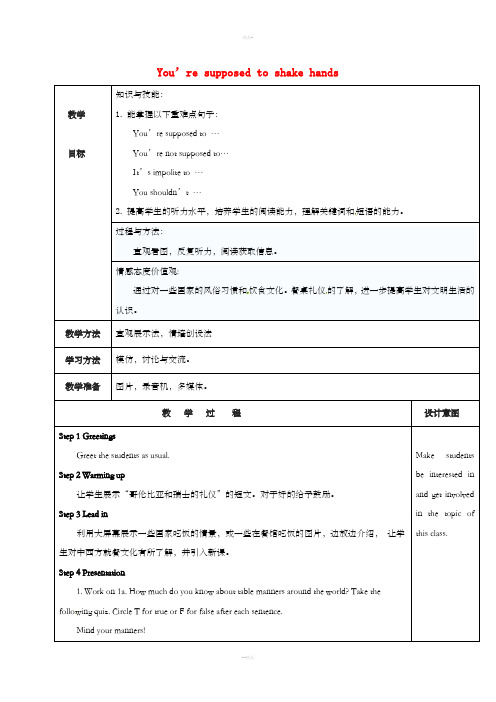
You’re supposed to shake hands教学目标知识与技能:1.能掌握以下重难点句子:You’re supposed to …You’re not supposed to…It’s impolite to …You shouldn’t …2.提高学生的听力水平,培养学生的阅读能力,理解关键词和短语的能力。
过程与方法:直观看图,反复听力,阅读获取信息。
情感态度价值观:通过对一些国家的风俗习惯和饮食文化。
餐桌礼仪的了解,进一步提高学生对文明生活的认识。
教学方法直观展示法,情境创设法学习方法模仿,讨论与交流。
教学准备图片,录音机,多媒体。
教学过程设计意图Step 1 GreetingsGreet the students as usual.Step 2 Warming up让学生展示“哥伦比亚和瑞士的礼仪”的短文。
对于好的给予鼓励。
Step 3 Lead in利用大屏幕展示一些国家吃饭的情景,或一些在餐馆吃饭的图片,边放边介绍,让学生对中西方就餐文化有所了解,并引入新课。
Step 4 Presentation1. Work on 1a. How much do you know about table manners around the world? Take the following quiz. Circle T for true or F for false after each sentence.Mind your manners!Make students be interested in and get involved in the topic of this class.1. In India, you’re supposed to eat with your hands. T F2. In China, you’re not supposed to stick your chopsticks into the food. T F3. In Korea, the youngest person is expected to start eating first. T F4. In France, you’re supposed to put your bread on the table. T F5. In China, it’s impolite to use your chopsticks to hit an empty bowl. T F1)先让学生自己做,老师指导,让他们理解每个句子的意思。
人教版九年级全一册英语Unit10重点语法知识点总结
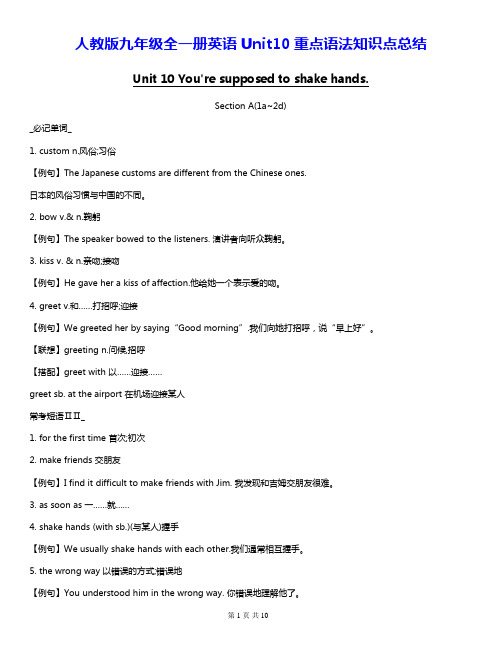
人教版九年级全一册英语Unit10重点语法知识点总结Unit 10 You're supposed to shake hands.Section A(1a~2d)_必记单词_1. custom n.风俗;习俗【例句】The Japanese customs are different from the Chinese ones.日本的风俗习惯与中国的不同。
2. bow v.& n.鞠躬【例句】The speaker bowed to the listeners. 演讲者向听众鞠躬。
3. kiss v. & n.亲吻;接吻【例句】He gave her a kiss of affection.他给她一个表示爱的吻。
4. greet v.和……打招呼;迎接【例句】We greeted her by saying“Good morning”.我们向她打招呼,说“早上好”。
【联想】greeting n.问候,招呼【搭配】greet with 以……迎接……greet sb. at the airport 在机场迎接某人常考短语ⅡⅡ_1. for the first time 首次;初次2. make friends 交朋友【例句】I find it difficult to make friends with Jim. 我发现和吉姆交朋友很难。
3. as soon as 一……就……4. shake hands (with sb.)(与某人)握手【例句】We usually shake hands with each other.我们通常相互握手。
5. the wrong way 以错误的方式;错误地【例句】You understood him in the wrong way. 你错误地理解他了。
6. hold out 伸出(手等)7. greet each other 互相问候8. to one’s surprise 令某人惊讶的是经典句型ⅢⅡ1. That's how people in Japan are expected to greet each other.那就是在日本人们互相问候的方式。
人教版初中英语九年级全册Unit 10 You’re supposed to shake hands

10-(9)了解并跨文化交际(恰当使用)。
四、情感态度
11.乐于参与英语活动,敢于用英语表达,积极与他人合作,体验自己的学习效果。
备教学
重、难点
内容
课标具体知识、技能、文化目标
知识与技能、文化意识的重、难点内容
课标具体策略目标选择
section A
section B
目标1
教学目标5(文化意识目标)
能恰当运用1 What are people in Korea supposed to do?
2when they meet for the first?When were you supposed to arrive?
3 I was supposed to arrive at 7:00.
7.每天课外阅读量最少达到750词。
(四)写
8.能运用…..词汇和…..语言形式以及参照范例(文章结构)简单描述人物或事件等,包括起草和修改。
二、文化意识
9.了解语言和语用的文化因素,体验跨文化交际。
三、学习策略
10-(1)利用读音规则和音标拼读词汇,利用上下文、非语言信息等理解词义,联想学习和记忆词汇,构词法等。
活动二1b
一、活动目标
80%学生能够听懂1b的对话,获取“who”信息;80%学生能够利用预测、语调、重音、问题等来获取听力信息。(达成目标2中的1b目标)
二、活动程序、策略及评价
1.构建听力动场:
布置任务:Listen and check your answers in 1a完成表格,然后自我评价。
80%学生能够利用读音规则和音标拼读词汇,利用语境、非语言信息等理解以上目标要求。
Unit10Youresupposedtoshakehands原文与翻译
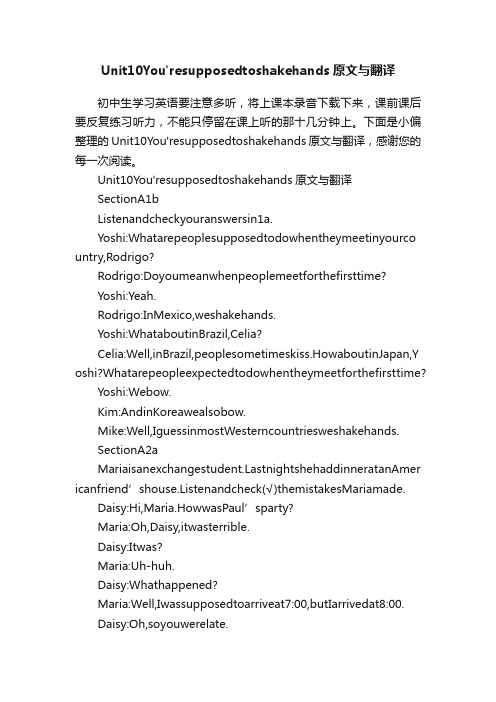
Unit10You'resupposedtoshakehands原文与翻译初中生学习英语要注意多听,将上课本录音下载下来,课前课后要反复练习听力,不能只停留在课上听的那十几分钟上。
下面是小偏整理的Unit10You'resupposedtoshakehands原文与翻译,感谢您的每一次阅读。
Unit10You'resupposedtoshakehands原文与翻译SectionA1bListenandcheckyouranswersin1a.Yoshi:Whatarepeoplesupposedtodowhentheymeetinyourco untry,Rodrigo?Rodrigo:Doyoumeanwhenpeoplemeetforthefirsttime?Yoshi:Yeah.Rodrigo:InMexico,weshakehands.Yoshi:WhataboutinBrazil,Celia?Celia:Well,inBrazil,peoplesometimeskiss.HowaboutinJapan,Y oshi?Whatarepeopleexpectedtodowhentheymeetforthefirsttime?Yoshi:Webow.Kim:AndinKoreawealsobow.Mike:Well,IguessinmostWesterncountriesweshakehands.SectionA2astnightshehaddinneratanAmer icanfriend’shouse.Listenandcheck(√)themistakesMariamade.Daisy:Hi,Maria.HowwasPaul’sparty?Maria:Oh,Daisy,itwasterrible.Daisy:Itwas?Maria:Uh-huh.Daisy:Whathappened?Maria:Well,Iwassupposedtoarriveat7:00,butIarrivedat8:00.Daisy:Oh,soyouwerelate.Maria:Yeah,butinmycountry,it’sdifferent.Whenyou’reinvit edfor7:00,you’reexpectedtocomelater!It’sconsideredstranget oturnupontime.Daisy:Isee.Maria:ThenwhenImetPaul’smom,Ikissedher.Daisy:Oh…youweresupposedtoshakehandsinstead.Maria:That’sright.AndIworeafanc ydress.Daisy:What’swrongwiththat?Maria:Well,itturnedoutthatitwasanoutdoorparty,Daisy.Every oneelsewasinaT-shirtandjeans.Daisy:Iguessnexttimeyoushouldaskwhatyou’resupposedto wear.SectionA2bListenagain.Fillintheblanks.Daisy:Hi,Maria.HowwasPaul’sparty?Maria:Oh,Daisy,itwasterrible.Daisy:Itwas?Maria:Uh-huh.Daisy:Whathappened?Maria:Well,Iwassupposedtoarriveat7:00,butIarrivedat8:00.Daisy:Oh,soyouwerelate.Maria:Yeah,butinmycountry,it’sdifferent.Whenyou’reinvit edfor7:00,you’reexpectedtocomelater!It’sconsi deredstranget oturnupontime.Daisy:Isee.Maria:ThenwhenImetPaul’smom,Ikissedher.Daisy:Oh…youweresupposedtoshakehandsinstead.Maria:That’sright.AndIworeafancydress.Daisy:What’swrongwiththat?Maria:Well,itturnedoutthatitwasanoutdoorparty,Daisy.EveryoneelsewasinaT-shirtandjeans.Daisy:Iguessnexttimeyoushouldaskwhatyou’resupposedto wear.SectionA2dRoleplaytheconversation.Howwasthewelcomepartyforforeignstudentslastnight?Great!Imadesomenewfriends.Butafunnythinghappened.What?ImetaJapaneseboycalledSato,andassoonasIheldoutmyhand, hebowed.That'showpeopleinJapanareexpectedtogreeteachother.It'sim politeifyoudon'tbow.Ididn'tknowthat.SoIjuststoodtherewithmyhandout.Finally,Ire turnedthebow.IrememberwhenlfirstmetMarielastyear,Ididthesamething.Ihe ldoutmyhandandtomysurprise,shekissedmeonbothsidesofmyfac e!Iwouldn'tmindthat!terlfoundoutFrenchpeoplearesupposedtokissw hentheyseeeachother.SectionA3aReadthefollowingopinionsofaColombianandaSwissstudent.I nwhichcountryisitOKtobe15minuteslatefordinner?TeresaLopezCall.ColomblaWhereI’mfrom,we’reprettyrelaxedabouttime.Wedon’tlik etorusharound,sowedon’tmindifpeoplearealittlelatesometimes.Ifyoutellafriendyou’regoingtotheirhousefordinner,it’sOKif youarriveabitlate.Weliketoenjoyourtimeslowly.Wevaluethetimew espendwithourfamilyandfriendsinoureverydaylives.Weoftenjustdropbyourfriendshomesifwehavetime.Wedon’tusuallyhavetomakeplanstomeetourfriends.Whenweseeeachoth er,it’spoliteforboystoshakehandsandforgirlstokisseachotheront hesideoftheface.Weoftenjustwalkaroundthetowncenter,seeingasmanyofourfr iendsaswecan!Marcleblanclausanne.SwitzerlandInSwitzerland,it’sveryimportanttobeontime.We’rethecapi talofclocksandwatches,afterall!Ifsomeoneinvitesyoutomeethimo rheratnoon,thenyou’reexpectedtobethereatnoon.Ifyou’reeven15minuteslate,y ourfriendmaygetmad.SoImake anefforttobeontimewhenImeetmyfriends.Ialwaysleavethehousee arlytoavoidheavytrafficbecauseIthinkit’simpolitetokeepothersw aiting.Also,wenevervisitafriend’shousewithoutcallingfirst.Wealmo stalwaysmakeplanstoseefriends.Weusuallyplantodosomethingin teresting,orgosomewheretogether.SectionB1bSteveisgoingtoChinatostudy.HisfriendYangMingistellinghim aboutthetablemannersinChina.Listenandnumberthepicturesinth eorderyouhearthem.YangMing:YoumustbeexcitedaboutleavingforChinatomorro w,Steve!Steve:Yeah,butI’malittlenervous,too.YangMing:Why?Steve:Well,foronething,Idon’tknowhowtousechopsticksver ywell…andIdon’tknowhowtobehaveatthedinnertable.YangMing:Oh,Isee.Well,oneimportantthingisthatyou’renots upposedtostarteatingfirstifthereareolderpeopleatthetable.Steve:That’sinteresting.IntheUnitedStates,itdoesn’tmatter.YangMing:Yeah,Iknow.It’salsoimpolitetostickyourchopsticksintoyourfood.Youshouldn’tpointatanyonewithyourchopsticks, either.Steve:Oh,OK.YangMing:Oh,andthere’sonemorethingyouneedtoknow.Yo u’renotsupposedtotalkwhenyou’reeatingdinner.Onlyparentsa reexpectedtotalkatthedinnertable.Childrenarenotallowedtospea k.Steve:Wow!That’s…that’sunusual!YangMing:Haha,I’mjustkidding!SectionB1cListenagain.Matchthesesentenceparts.YangMing:YoumustbeexcitedaboutleavingforChinatomorro w,Steve!Steve:Yeah,butI’malittlenervous,too.YangMing:Why?Steve:Well,foronething,Idon’tknowhowtousechopsticksver ywell…andIdon’tknowhowtobehaveatthedinnertable.YangMing:Oh,Isee.Well,oneimportantthingisthatyou’renots upposedtostarteatingfirstifthereareolderpeopleatthetable.Steve:That’sinteresting.IntheUnitedStates,itdoesn’tmatter.YangMing:Yeah,Iknow.It’salsoimpolitetostickyourchopstick sintoyourfood.Youshouldn’tpo intatanyonewithyourchopsticks, either.Steve:Oh,OK.YangMing:Oh,andthere’sonemorethingyouneedtoknow.Yo u’renotsupposedtotalkwhenyou’reeatingdinner.Onlyparentsa reexpectedtotalkatthedinnertable.Childrenarenotallowedtospea k.Steve:Wow!That’s…that’sunusual!Yang Ming:Haha,I’mjustkidding!Readtheletterandanswerthequestions.DearLaura,Thanksforyourmessage.Yes,I’mhavingagreattimeonmystudentexchangeprograminFrance.IwasabitnervousbeforeIar rivedhere,buttherewasnoreasontobe.Myhostfamilyisreallynice.Th eygooutoftheirwaytomakemefeelathome.Thegrandmotherknow sthatImissChinesefoodalot.SosheactuallylearnedhowtomakeChi nesefood!Shealsohasateenagegranddaughteraboutmyagewhois reallykind.ShealwaystalkstomeinFrenchtohelpmepractice.Youwo uldn’tbelievehowquicklymyFrenchhasimprovedbecauseofthat.I’mverycomfortablespeakingFrenchnow.AlthoughIstillmak elotsofmistakes,itdoesn’tworrymeasitusedto.Mybiggestchallengeislearninghowtobehaveatthedinnertabl e.Asyoucanimagine,thingsareverydifferentfromthewaytheyareat home.Forexample,you’renotsupposedtoputyourbreadonyourpl ate.You’resupposedtoputitonthetable!Ithoughtthatwasprettyst rangeatfirst,butnowI’musedtoit.Anotherexampl eisthatyou’renotsupposedtoeatanythingwit hyourhandsexceptbread,notevenfruit.Youhavetocutitupandeatit withafolk.Anotherthingisthatitisimpolitetosayyou’refull.Ifyoudo n’twantanymorefood,youshouldjustsay,“Thatwasdelicious.”Al so,you’renotsupposedtoputyourelbowson thetable.Ihavetosayt hatIfinditdifficulttoremembereverything,butI’mgraduallygettingusedtoit.Idon’tfindFrenchcustoms sostrangeanymore,I’llwriteagainsoonandtellyoumoreaboutmylifeinFrance.Hopeyou’rehavingagoodschoolyear.Yours,LinYue翻译:凯蒂:昨晚为留学生举办的欢迎派对怎么样?约翰:真棒!我交了一些新朋友,不过发生了一件很有趣的事情。
九年级英语全册Unit10You’resupposedtoshakehandsPeriod1Mat
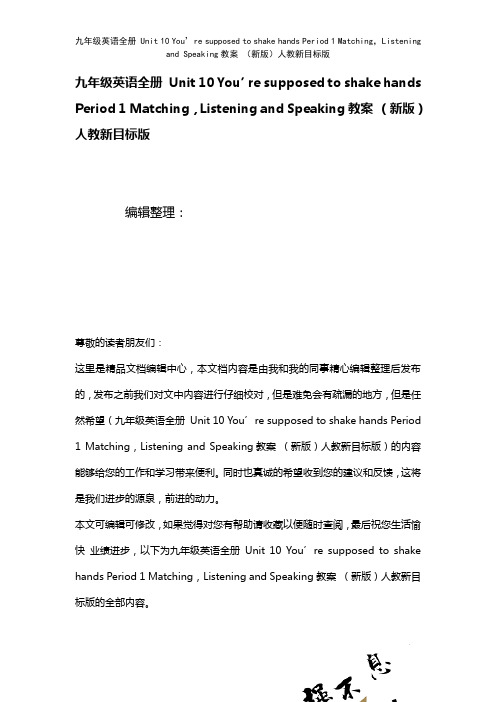
九年级英语全册Unit 10 You’re supposed to shake hands Period 1 Matching,Listening and Speaking教案(新版)人教新目标版编辑整理:尊敬的读者朋友们:这里是精品文档编辑中心,本文档内容是由我和我的同事精心编辑整理后发布的,发布之前我们对文中内容进行仔细校对,但是难免会有疏漏的地方,但是任然希望(九年级英语全册Unit 10 You’re supposed to shake hands Period 1 Matching,Listening and Speaking教案(新版)人教新目标版)的内容能够给您的工作和学习带来便利。
同时也真诚的希望收到您的建议和反馈,这将是我们进步的源泉,前进的动力。
本文可编辑可修改,如果觉得对您有帮助请收藏以便随时查阅,最后祝您生活愉快业绩进步,以下为九年级英语全册Unit 10 You’re supposed to shake hands Period 1 Matching,Listening and Speaking教案(新版)人教新目标版的全部内容。
Unit 10: You’re supposedto shake hands.Part 1: Teaching Design第一部分:教学设计Functions Talk what you are supposed to doStructures supposed to + infinitiveTarget language —How was the dinner at Paul’s house last night?—Well, it was OK, but I made some mistakes。
I was supposed to arriv e at 7:00, but I arrived at 8:00.Vocabulary kiss, bow, table manners, chopstick, fork, spoon, napkin, greet, rude, wipe, point, stick, shakehands, be supposed to, drop by, pick up,You should…Period 1: Matching, Listening and Speaking(What are people supposed to do…?)Objectives●To learn to understand and use supposed to + infinitive●To listen and speak what you are supposed to doProcedures■Warm ing up by studying the title “You're supposed to shake hands。
Unit10You'resupposedtoshakehands.知识梳理人教版英语九年级全册

Unit 10 You're supposed to shake hands.短语归纳1.首次;初次____________________2.(与某人)握手___________________3.……怎么样/如何____________________4.以错误的方式;错误地____________5.一……就……____________________6.伸出(手等)________________________________________ 8.发现;找出;查明_________________ ____________________ 10.顺便拜访;顺便进入_____________11.在……的两边____________________ 12.在某人的日常生活中_____________ 13.尽可能……____________________ 14.准时,按时____________________ 15.……的首都/国都____________________ 16.在中午____________________ 17.大动肝火;气愤____________________ 18.有趣的事情________________________________________ 20把……擦掉____________________21.脱下(衣服);(飞机等)起飞________________22.餐桌礼仪____________________ 23.把……插入……____________________ 24.指着____________________指向____________________ 指出____________________25.因……而感谢____________________ 因……而感谢某人____________________26.玩得高兴,过得愉快_________________ 27.使(某人)感到宾至如归______________________________ 29.因为;由于____________________30.最初;首先____________________ (反:最后;终于____________________)____________________ 32.像____________________ 33.出席;露面____________________ ____________________35.毕竟;终归________________________________________38.和……不同____________________ (反:和……相同____________________)____________________40.对……感到放松/随意___________________Section A风俗习惯1)custom〔名词〕风俗;习俗The customs are different from country to country.I don't like the custom of giving presents in that country.The Japanese customs are different from the Chinese ones.Nailbiting is one of her bad habits.2.bow 鞠躬bow①〔不及物动词〕鞠躬bow to/before...向……鞠躬The speaker bowed to/before the listeners.②〔及物动词〕低(头)She bowed her head.③〔名词〕鞠躬(读作/bau/);弓(读作/bəu/)The Japanese usually take a bow while greeting.He made his son a bow.3.shake hands 握手shake hands 握手其中shake(shook,shaken) 既可用作及物动词,也可用作不及物动词,意为“摇动;抖动”。
- 1、下载文档前请自行甄别文档内容的完整性,平台不提供额外的编辑、内容补充、找答案等附加服务。
- 2、"仅部分预览"的文档,不可在线预览部分如存在完整性等问题,可反馈申请退款(可完整预览的文档不适用该条件!)。
- 3、如文档侵犯您的权益,请联系客服反馈,我们会尽快为您处理(人工客服工作时间:9:00-18:30)。
Unit 10 You’re supposed to shake hands.The third period Section A (Grammar focus—4c)【学习目标】1. 让学生能听、说、读、写下列词汇和短语。
passport n. 护照 chalk n. 粉笔 blackboard n. 黑板northern adj. 北方的;北部的 coast / n. 海岸;海滨season n. 季;季节 knock v. 敲;击eastern adj. 东方的;东部的worth adj. 值得;有⋯⋯价值(的)manner n. 方式;方法 (pl.) 礼貌;礼仪be supposed to ; be expected to; be important to; as …as possible; be worth doing sth; good manners2. 让学生能够正确使用以下常用表达:1) When you go abroad, it is important to bring your passport.2) After class, students are supposed to clean the chalk off the blackboard.3)—Is it impolite to keep others waiting?—Yes, it’s very impolite to keep others waiting.4)—Is it important to be on time?—Yes, it’s important to be on time.3.让学生学会固定短语be supposed to do 的用法、句型结构与转换。
【重点难点】掌握Grammar Focus里的句子掌握be supposed to; be expected to; be important to的用法。
【新知预习】根据句意和首字母提示完成单词。
1. —Am I supposed to wear jeans?—No, you’re e___________ to wear a suit and tie.2. The question is not w___________ discussing again and again.3. It’s good m__________ to greet your teacher when you meet them.4. China is an e__________ country.5. Can I see your ___________, please Miss?【课堂探究】探究1. —Is it important to be on time?—Yes, it’s important to be on time.it用作形式主语,代替了真正的主语to be…这一不定式,不定式可以做主语,但是又往往用it作形式主语来代替。
如:To invent new things is his job. = It’s his job to invent new things. 发明新东西是他的工作。
To help others is good when they are in trouble. =It’s good to help others when they are in trouble.帮助那些处于麻烦当中的人是好事。
【针对练习】Is _____ necessary to take off our shoes when we enter the lab?A. everyoneB. thisC. herD. it探究2. …, but it is helpful to learn as many of these customs as possible.As… as possible = as… as one can 表示尽可能的……eg: You can eat as much as possible today .【针对练习】During my stay in Beijing , she did_____ to help me .A. as much as possibleB. so much as she couldC. as possible as she couldD.as much as could 【达标练习】I. 单项选择。
( ) 1. She had never been to the Great Wall before. Today she saw it ________ the first time.A. atB. forC. inD. by( )2. If you go into trouble you can ________ your teacher ________ help.A. turn; toB. ask; forC. help; withD. look; for( )3. Do you need ________ to read on the train?A. special anythingB. any special thingC. anything speciallyD. anything special( )4. He came______ late. So he only had_____ bread.A.a bit; a bitB.a bit of; a bit ofC. a bit; a bit ofD. a bit; a bit( )5. I t’s very impolite _________ others _________.A. keep; waitingB. to keep; waitingC. to keep; waitD. keep; waitII. 根据所给汉语完成英语句子。
1.—你应该什么时候到?—我应该在七点钟到。
—When were you_________ ___________ _________?—I ________ __________ __________ arrive at 7:00.2. 尽可能多的学习那些风俗习惯是有帮助的。
It is helpful __________ ________________ many of these customs.3. 如果会议室有人,在进去之前你应该先敲门。
If there are people in the meeting room, you _______ _______ ______ knock before entering.4. 在很多东欧国家,握手前你应该摘掉手套的。
In many eastern European countries, you _________ ________ __________ takeoff your gloves before shaking hands.5. 关于美国的餐桌礼仪你是怎么看的?What do you think of the __________ __________ in America?6. 如果你在冬季去访问挪威北部海岸,你应该带着暖和的衣服。
If you visit _______ ________ _________ _________ Norway during the winterseason, it is supposed to pack warm clothes.III. 用所给单词的适当形式填空。
1. It’s impolite ___________(be) late for a meeting.2. Y ou’re expected ________(wear) a suit and tie.3. He is going to visit the ___________(north) coast of Norway next vacation.4. It’s our duty __________(clean) the blackboard after class.5. I don’t like keeping others __________(wait). It’s impolite.6. You are supposed to takeoff your gloves before ____________(shake) hands.●Time, Time again, I ask myself (请写出这节课你的收获,完成下面的反思)【学后反思】九年级英语(上)第10单元学案参考答案第三课时【新知预习】1.expected2.worth3.manner4.eastern5.passport【课堂探究】探究1【针对练习】D探究2【针对练习】A【达标练习】I、1.B 2.B 3.D 4.C 5.CII、1.supposed to arrive was supposed to 2.to learn about 3.are supposed to 4. are supposed to 5.table manners 6.to the north ofIII、1.to be 2.to wear 3.northern 4.to clean 5.waiting。
